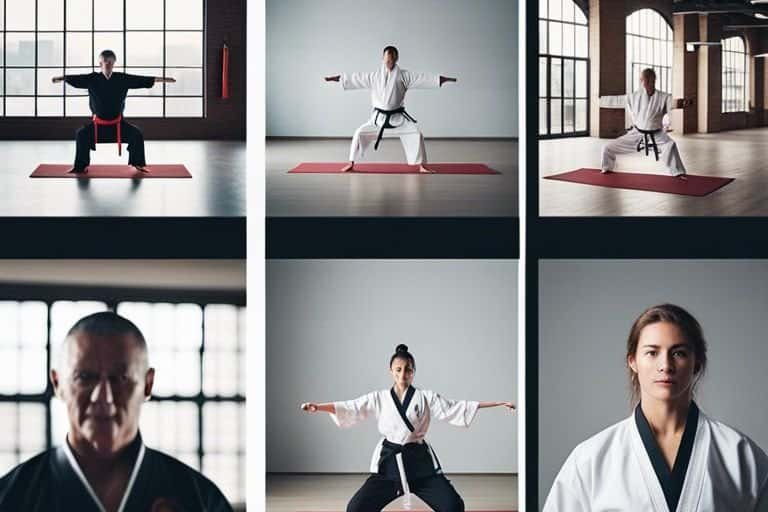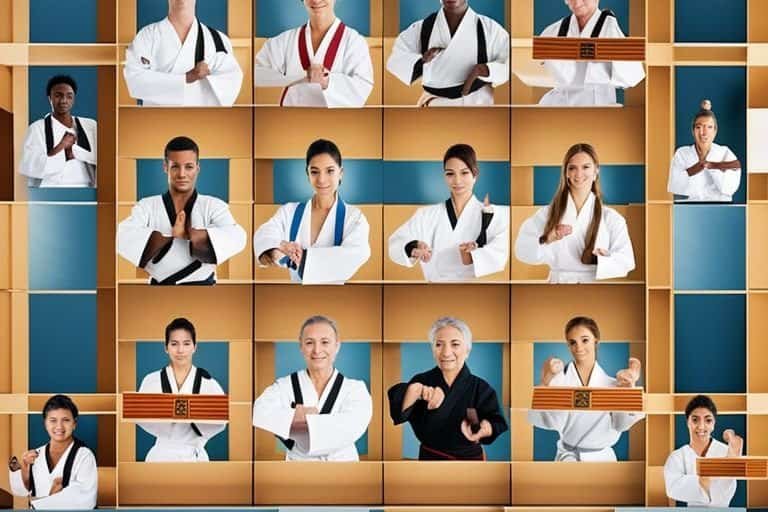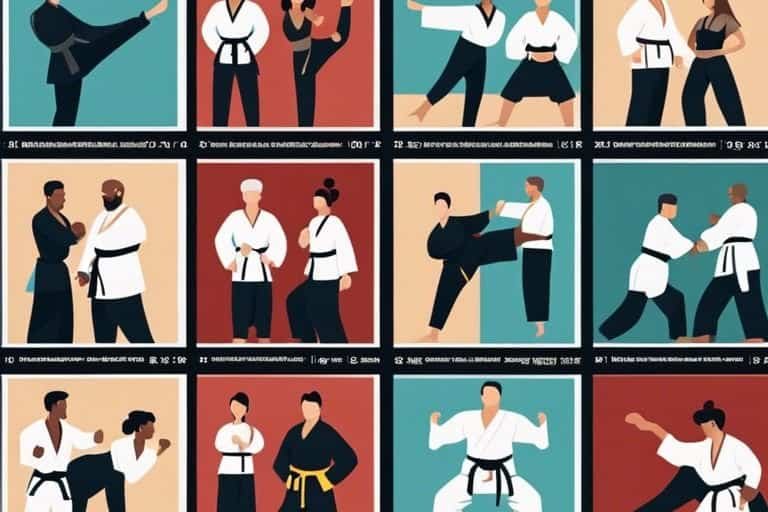Martial arts is a centuries-old practice that encompasses a variety of disciplines aimed at improving physical and mental wellbeing. Engaging in the practice of martial arts can lead to significant improvements in fitness and health. The combination of rigorous physical activity, focused mental discipline, and practical self-defence training makes martial arts a uniquely effective way to enhance overall wellness. From improving cardiovascular endurance and strength to enhancing flexibility and balance, the benefits of martial arts training extend to all aspects of physical fitness. Additionally, the mental and emotional benefits of martial arts cannot be overlooked, with practitioners experiencing reduced stress levels, improved focus and concentration, and increased self-confidence. By incorporating elements of cardiovascular exercise, strength training, and mindfulness, martial arts offers a comprehensive approach to enhancing both physical fitness and mental health.
Key Takeaways:
- Improved cardiovascular health: Martial arts training can help improve heart health and increase cardiovascular endurance through intense and sustained physical activity.
- Enhanced strength and flexibility: Regular practice of martial arts can lead to improved strength, agility, and flexibility, resulting in better overall physical fitness.
- Stress relief and mental well-being: Engaging in martial arts can also promote mental well-being by reducing stress, increasing focus and discipline, and boosting self-confidence.
The Physical Benefits of Martial Arts
Enhanced Cardiovascular Health
Martial arts training involves a significant amount of cardiovascular exercise, from intense sparring sessions to continuous movement in forms and drills. This constant cardiovascular activity helps to improve heart health, increase stamina, and lower the risk of heart disease. Regular practice of martial arts can lead to a stronger and more efficient heart muscle, enabling it to pump blood more effectively throughout the body.
Increased Strength and Muscle Tone
Engaging in martial arts requires the use of various muscle groups, leading to increased strength, endurance, and muscle tone. Kicks, punches, and grappling movements all contribute to the development of lean muscle mass and overall physical strength. Through consistent training, individuals can expect to see improvements in their muscular endurance and overall physique.
Additionally, the repetitive nature of many martial arts techniques leads to the strengthening and toning of specific muscle groups, creating a balanced and toned physique.
Improved Flexibility and Balance
Martial arts training incorporates a wide range of dynamic stretching and movements, which over time leads to improved flexibility, agility, and balance. These skills are not only crucial for performing various martial arts techniques effectively but also contribute to reduced risk of injury and enhanced overall physical performance in everyday activities.
By regularly practising martial arts, individuals can expect to experience improved joint mobility, better posture, and a greater sense of body awareness and control.

The Mental Advantages of Martial Arts
Martial arts offer numerous benefits for mental well-being in addition to physical fitness. Engaging in martial arts can have a positive impact on stress reduction, mental health, improved focus, and cognitive function. These mental advantages are often overlooked but are crucial for overall well-being. According to Top 12 Health Benefits of Martial Arts, the mental benefits of martial arts are equally as important as the physical benefits.
Stress Reduction and Mental Health
One of the significant mental advantages of martial arts is its ability to reduce stress and improve mental health. Engaging in martial arts requires a high level of focus and discipline, which can help individuals manage their stress levels. The physical activity involved in martial arts also releases endorphins, which are natural mood lifters, thereby contributing to improved mental well-being. The structured nature of martial arts training provides practitioners with a sense of purpose and accomplishment, which can positively impact their overall mental health.
Improved Focus and Cognitive Function
Another key mental advantage of martial arts is the improvement in focus and cognitive function. Martial arts training demands a high level of concentration, which can help individuals sharpen their focus and attention to detail. The combination of physical movements, memorisation of techniques, and sparring exercises can enhance cognitive function by challenging the brain to adapt and respond quickly. The discipline and mental clarity developed through martial arts can also translate into improved performance in academics and professional settings.
Furthermore, the practice of martial arts involves mindful breathing and meditation techniques, which are known to reduce stress and improve cognitive function. This holistic approach to training not only strengthens the body but also nurtures the mind, promoting a sense of balance and well-being.

Martial Arts and Weight Management
When it comes to improving fitness and maintaining a healthy weight, martial arts can be an excellent form of exercise. Not only does it provide a full-body workout, but it also offers the opportunity to learn self-defence techniques and improve mental focus. Whether you are practising karate, taekwondo, or Brazilian jiu-jitsu, martial arts can significantly contribute to weight management.
The Role of Martial Arts in Burning Calories
Martial arts involve a combination of aerobic and anaerobic exercises, which are highly effective in burning calories and shedding excess body fat. Techniques such as striking, kicking, grappling, and sparring require intense physical exertion, leading to a high calorie burn. Engaging in regular martial arts training can help individuals achieve a healthy weight and improve overall fitness levels.
Diet and Nutrition in Martial Arts Training
In addition to physical activity, diet and nutrition play a crucial role in martial arts training and weight management. Consuming a well-balanced diet that is rich in lean protein, whole grains, and plenty of fruits and vegetables is essential for supporting the body’s energy needs and muscle recovery. Moreover, staying hydrated and avoiding excessive consumption of processed foods and sugary drinks is vital for maintaining a healthy weight and optimising performance in martial arts.
It’s important for martial artists to fuel their bodies with the right nutrients to support their training and achieve their fitness goals. By incorporating a balanced diet and making informed nutritional choices, individuals can maximise the benefits of their martial arts practice and contribute to effective weight management.
Integrating Martial Arts into Your Fitness Routine
Integrating martial arts into your fitness routine can bring a whole new dimension to your workout regimen. Not only does it help in improving physical fitness, but it also enhances mental discipline and overall well-being. Martial arts offer a unique combination of strength, flexibility, endurance, and agility training, making it a holistic approach to fitness.
Choosing the Right Martial Art for You
When integrating martial arts into your fitness routine, it is crucial to choose the right discipline that aligns with your goals and interests. Whether you are interested in the striking techniques of karate, the grappling and ground fighting of Brazilian Jiu-Jitsu, or the fluid movements of Taekwondo, selecting the right martial art ensures that you stay engaged and motivated throughout your fitness journey. Consider your fitness level, preferred workout intensity, and personal objectives when making this decision.
Setting Realistic Goals and Expectations
Setting realistic goals is paramount when incorporating martial arts into your fitness routine. It is essential to understand that progress may be gradual, and mastering the techniques and forms takes time and patience. Embracing a gradual approach and acknowledging the learning curve will prevent frustration and reduce the risk of injury, ensuring a sustainable and fulfilling martial arts experience.
By setting achievable milestones and maintaining a positive mindset throughout your martial arts training, you can enhance your physical and mental well-being while enjoying the journey towards improved fitness and health.
Conclusion: The Physical Benefits of Martial Arts
Martial arts offer numerous physical benefits that can significantly improve fitness and health. From increased strength, flexibility, and overall cardiovascular fitness to improved coordination, balance, and agility, the practice of martial arts can have a transformative impact on one’s physical well-being. Additionally, martial arts training involves a full-body workout that helps in burning calories, gaining muscle mass, and improving endurance. With regular practice, individuals can experience not only visible physical changes but also enhanced mental well-being, reduced stress levels, and increased confidence. Overall, incorporating martial arts into one’s fitness routine can lead to lasting improvements in both physical health and general well-being.
Physical Benefits of Martial Arts
FAQ
Q: How can martial arts improve fitness and health?
A: Martial arts can improve fitness and health in several ways. It provides a full-body workout, increases flexibility, enhances cardiovascular health, and builds strength and endurance. Additionally, martial arts training can improve mental focus, discipline, and overall well-being.
Q: What are the physical benefits of practising martial arts?
A: Practising martial arts can lead to numerous physical benefits, including improved muscle tone, weight loss, increased agility and coordination, and better overall physical conditioning. It also helps in developing better posture, balance, and reflexes.
Q: Is martial arts suitable for people of all ages?
A: Yes, martial arts is suitable for people of all ages. There are various forms of martial arts that cater to different age groups and fitness levels, making it accessible to everyone. It can be beneficial for children, adults, and even seniors in maintaining and improving their fitness and health.
Q: Can martial arts help in reducing stress and improving mental well-being?
A: Yes, martial arts can help in reducing stress and improving mental well-being. The focus and concentration required in martial arts training can help individuals to clear their minds and relieve stress. Additionally, the practice of martial arts promotes self-discipline and self-confidence, contributing to better mental well-being.
Q: Are there any risks involved in practising martial arts?
A: Like any physical activity, there are risks involved in practising martial arts. However, with proper instruction, supervision, and adherence to safety guidelines, the risks can be minimised. It is essential to train under qualified instructors and to use protective gear to reduce the likelihood of injury.



